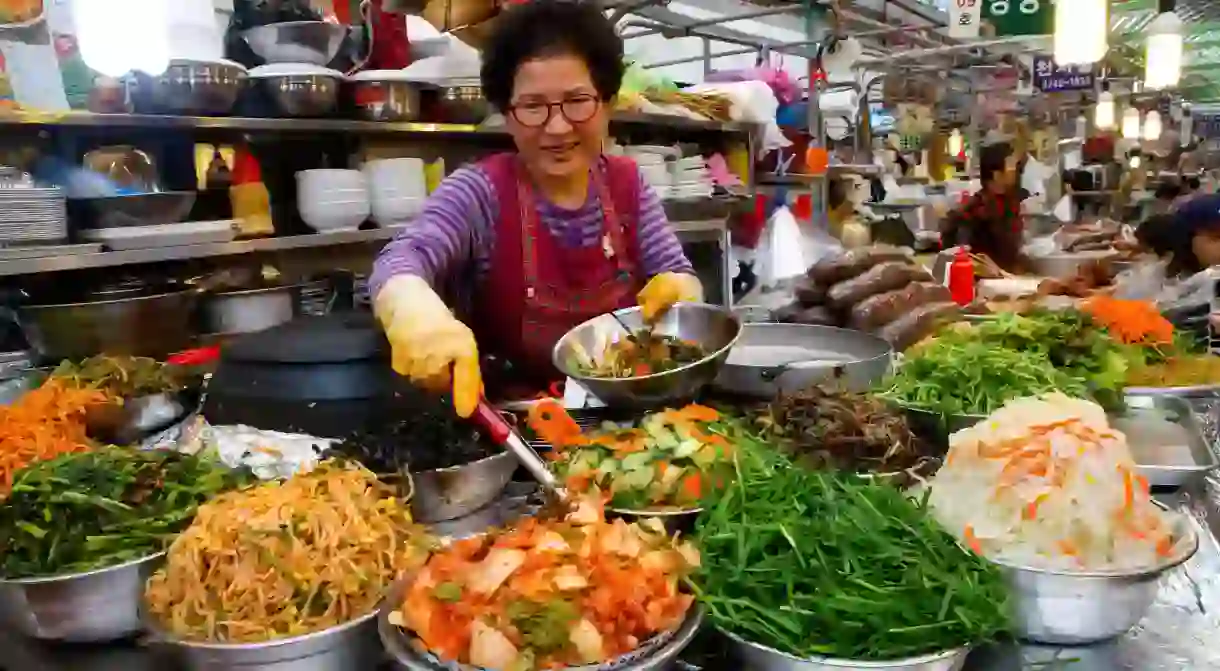A Guide to Being Vegan in South Korea

Following a vegan diet in South Korea is not without its challenges. But recent interest in sustainable, plant-based living has given rise to a flourishing veganism scene and an ever-growing number of vegan-friendly dining options. Here’s your guide to finding the best vegan food in the country.
So, you’re vegan, but you find yourself in the meat-lovers’ paradise of South Korea. How do you survive the smell of roasting meat that seems to follow you wherever you go? The countless galbi (rib) joints and seafood restaurants that line the streets of every city and town? The never-ending invites for all-you-can-eat Korean barbecue?
Fret not, dear vegan. There’s a growing movement here of people just like you. That’s not to say that being a vegan in South Korea will be easy, but a plant-based movement seems determined to make its mark on Korean culture nonetheless.

The vegan revolution begins
Marie Frenette has made it her mission to promote veganism and plant-based living in South Korea, while shedding light on the issue of animal agriculture and its impact on climate change. In addition to being a vegan herself, she is also the CEO and co-founder of HAE Creative, a business that works with mission-based companies and restaurants to provide consumers with better access to more sustainable food and beverage options.
She has, in a way, been at the forefront of the so-called ‘vegan revolution’ – a movement that is on the rise in South Korea.
“The Korean diet was traditionally quite plant-centric and only became meat-heavy as the country developed,” she says. “But there is a new wave of young people who are interested in things like feminism, animal rights, environmental protection. Animal agriculture is related to [many] of these topics so rejecting it is a way of protesting and improving society.”
Local grassroots movements and an increased appetite for sustainability-focused foods and products have led to the development of a burgeoning veganism scene and close-knit community of plant eaters.

Find comfort in community
Frenette suggests newbies to Korea should seek connection with other vegans – either in-person or online – as a way to get used to both local culture and veganism in Korea.
“The Seoul Veggie Club is an example of an online community where you can connect with other vegans and ask questions without judgment,” she says. “The group welcomes all, no matter where they are in their journey.”
Attending festivals and expos such as the Seoul Vegan Festival and the Vegan Festa is also a great way to mingle with like-minded herbivores, as is signing up for vegan-centric Korean language clubs.

Explore the vegan dining scene
As the vegan community continues to grow in South Korea, so, too, does the number of vegan restaurants and delivery services, particularly in metropolitan areas.
If you’re in Seoul and hunger strikes, Frenette recommends heading to Insadong for Buddhist temple cuisine or trend-forward neighborhoods such as Hongdae (home to the vegan guesthouse Sleeping Strawberry), Hapjeong, Mangwon and Itaewon for contemporary plant-based options.
“I am really spoiled. My neighborhood, Haebangchon, has vegan options up and down the street. I’m talking dishes like Moroccan tagine from Casablanca, Vietnamese pho from Banh Mi Lee, Middle Eastern fusion tacos at Adm’s Taco, vegan lattes from Le Cafe and Vegan Space, and a full vegan menu at Vegetus,” Frenette explains.
She says that one of the best ways to find a vegan dining establishment near you is through apps such as Happy Cow, which boasts an English directory of some 400 Korea-based vegan-friendly restaurants, and Vegefeed.
“Of course, if you’re in a jam, Lotteria’s Miracle Burger is a good option and 7-11 offers microwaveable vegan dumplings by Unlimeat in their freezer section. You can also look out for vegan ramen at convenience stores and supermarkets,” she adds.
Should you find yourself out with friends or colleagues at a restaurant specialising in meat or seafood, simply ask for bap (rice) and banchan (side dishes). These are typically served with the meal anyway and can be mixed together with a dollop of gochujang (red chilli paste) to make an improvised bowl of bibimbap.

Get creative in the kitchen
Meal prepping at home can be a great way to ensure you always have access to meals that align with your dietary needs, especially if you have limited vegan-friendly options where you live, study or work.
Frenette suggests purchasing produce from local traditional markets, where options are vast and prices are affordable.
“For harder-to-find items and ingredients, consider Vegan Space, Korea’s first fully-vegan shop that sells groceries and non-food items. Also, iHerb ships to Korea and Coupang has many options that can be shipped from overseas,” she says.
If you prefer to leave the cooking to the professionals but don’t have access to vegan-friendly restaurants, check out Sprout, a vegan meal service that ships nationwide.

Be patient
Finally, the key to being vegan in South Korea is to be patient. Explaining that you don’t eat meat and dairy products is difficult enough with a language barrier, but can be even more frustrating here, as the Korean terms for “vegan” and “vegetarian” are interchangeable because the lifestyle is still so new.
“Koreans know the term chae shik, which means ‘vegetarian’, but they will still often assume you eat eggs, milk and sometimes even fish. Identifying yourself as wan jeon chae shik means ‘completely vegetarian’ and could be a bit clearer,” Frenette explains.
“It’s not easy to be in a new country that isn’t as used to the concept of veganism,” she adds, “but the lifestyle is becoming more widely recognized bit by bit, day by day.”














